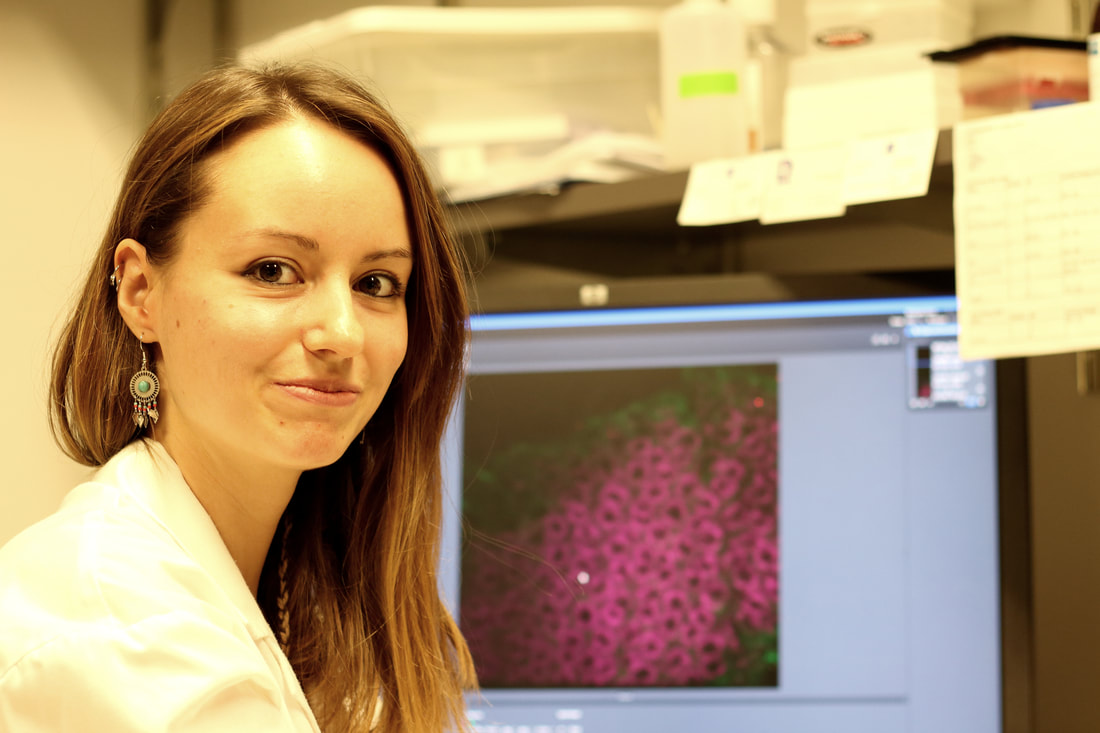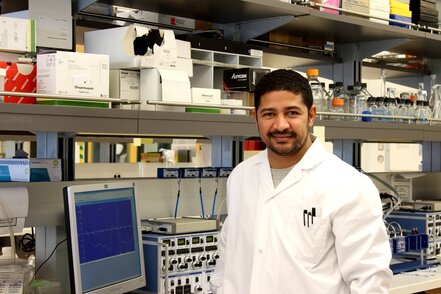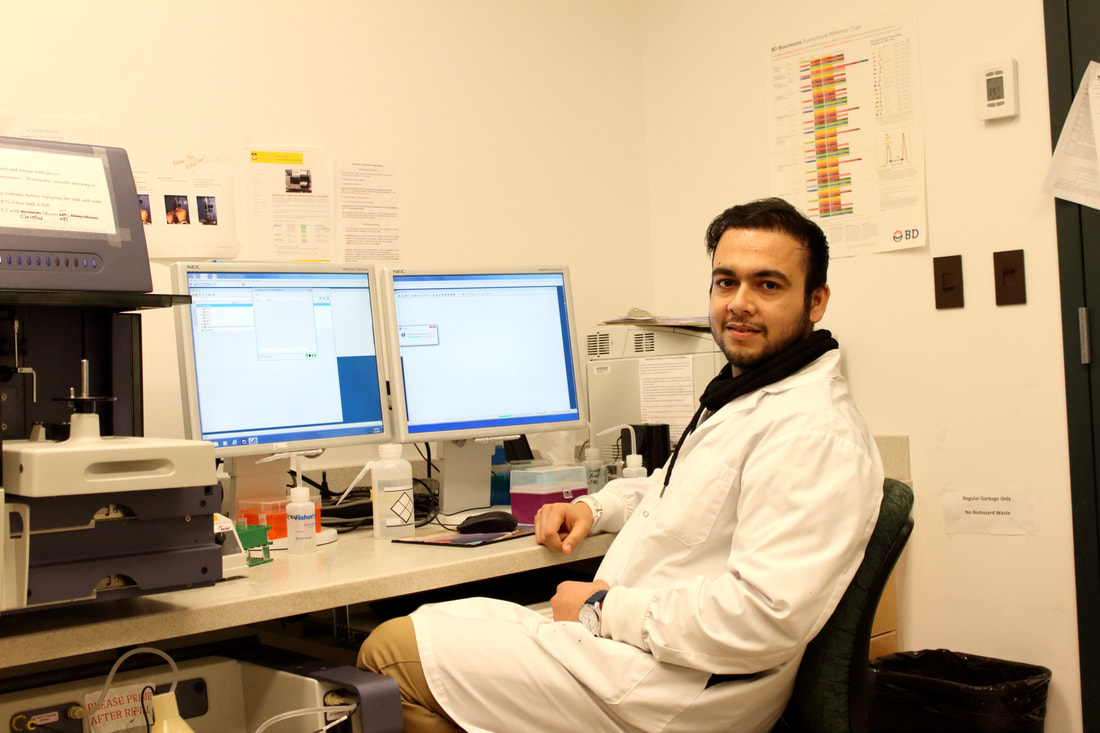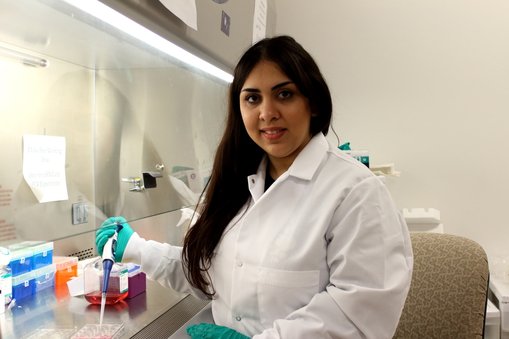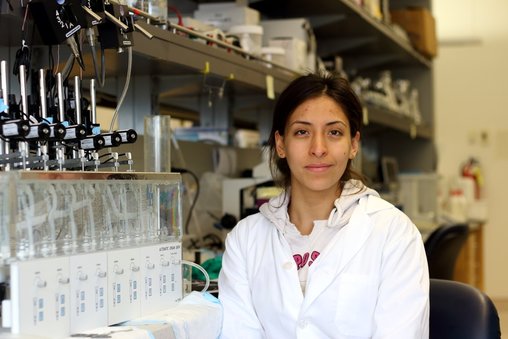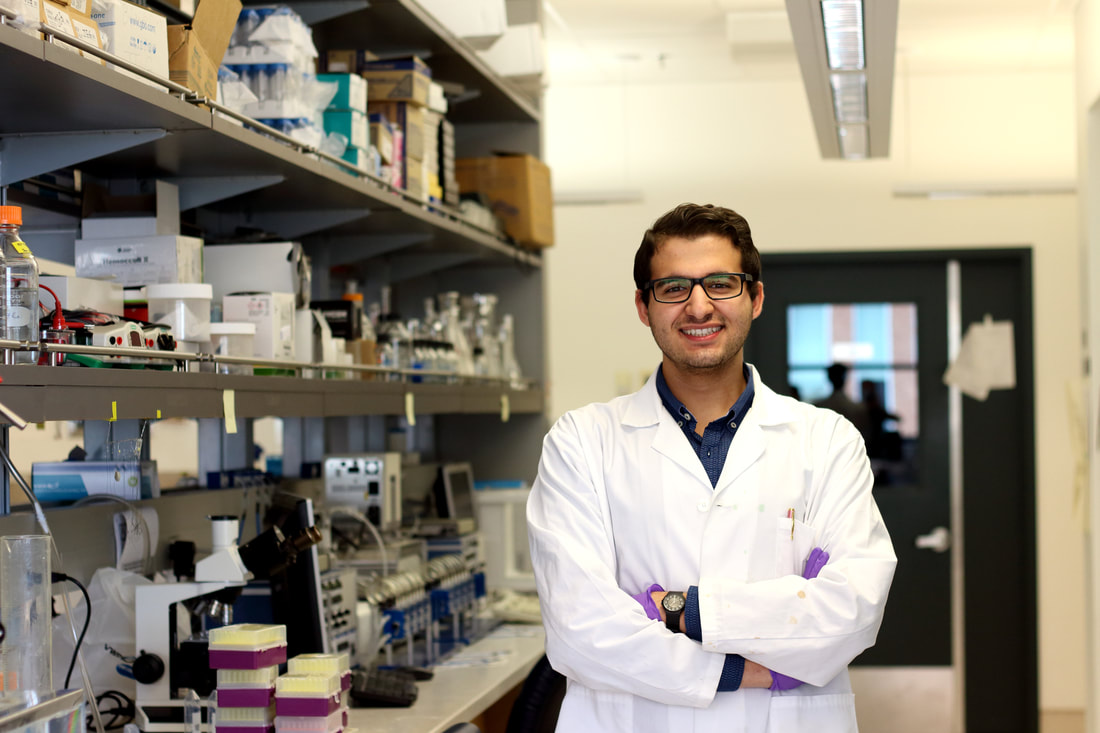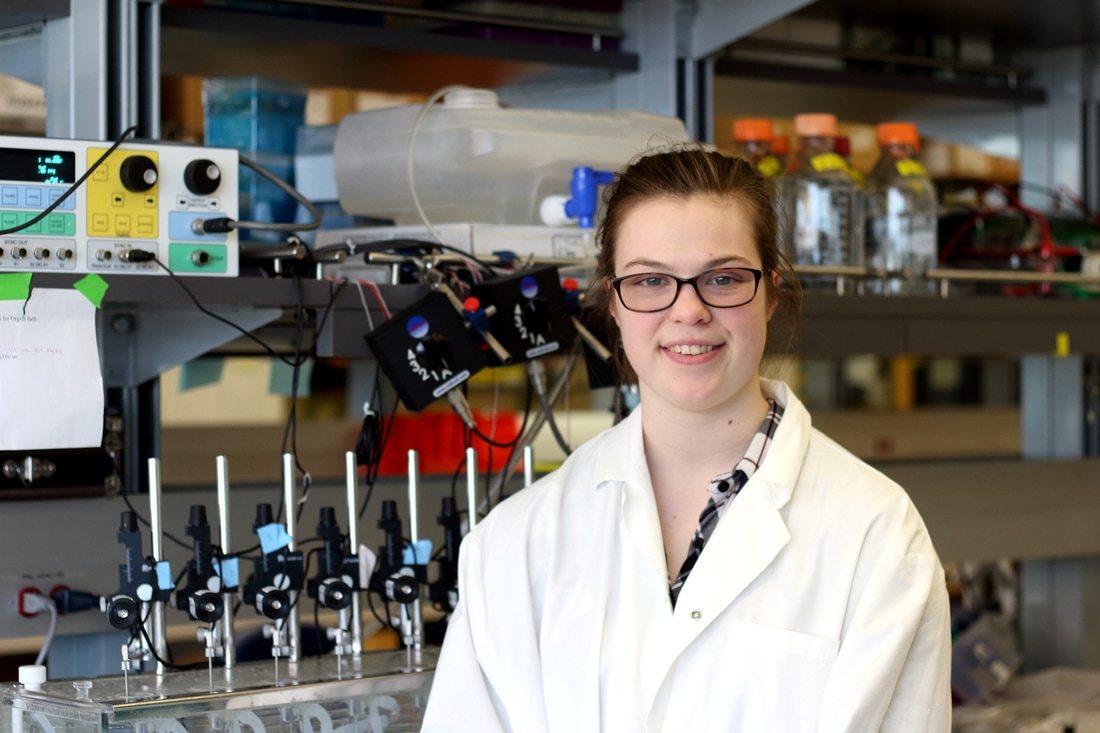|
|
Laetitia Kermarrec (Post-doc)PhDLaëtitia received her BSc in biology and biochemistry as well as her first MSc in nutrition and healthy foods development from the University of Nantes, France. Her motivation and aspiration in science made her the ideal candidate for Master's internship in a Contract Research Organization (Biofortis, Nantes, France), which provides nutrition expertise to research and development professionals. Caught up by her particular interest in exploring the cross talk between nutrition and neurosciences, she decided to have a second MSc in neurosciences from the University of Pierre and Marie Curie of Paris 6 (France) to deepen her knowledge in the field of neurobiology. Therefore, her MSc in Neurobiology of olfaction unit (UR1197, Jouy-en-Josas, France) was designed to investigate the impact of obesity on olfactory behavior and food odors perception using a murine model of obesity. In February 2016, she completed her PhD at the Neuro-gastroenterology unit of Nantes (UMR913, Nantes, France), where her research project aimed to decipher the interaction between the enteric nervous system and the immune system in physiological and pathological conditions using different experimental systems and models. In May 2016, Laëtitia joined Ghia lab, Immunology department as a postdoctoral researcher and her current research project aims to understanding the crucial role of semaphorin 3E/Plexin D1 signaling pathway in the context of intestinal inflammation using human clinical biopsies, murine models of Inflammatory Bowel Disease (IBD) and human cell culture. The ultimate goal of her research project is to identify potential therapeutic strategies in IBD. Although, Laëtitia has high passion and believe in science and the research environment, but she is also interested in drawing, reading, sports (fitness, running, swimming), socializing and listening to music.
|
Nour Eissa (Ph.D. Student & Post-Doctoral fellow)BVetMed, MVetMed, PhDsNour Eissa is a veterinarian & immunologist interested in the intersection of inflammation, Innate Immunity, Host-Microbe interaction, apoptosis and translational biology. He received his veterinary degree in 08/2004 from faculty of Veterinary Medicine, South Valley University (Egypt) and pursued post-graduate veterinary diploma in 12/2006 from faculty of veterinary medicine, Cairo University (Egypt). In 03/2011, he received a Master in veterinary medicine from Faculty of Veterinary Medicine, Benha University (Egypt) and his research project was designed to study the potential use of non-pathogenic pseudomonas strains as biological control agents against different bacterial diseases. In 09/2014, he finished his PhD research work with Dr. Han-Ping Wang at The Ohio State University (USA), where he worked to explore the role of commensal microbiota in modulating various stress responses, and its impact on stress-related genes. In 11/2014, he joined Dr. Jean-Eric Ghia Lab and decided to pursue his second PhD in Immunology. Since 01/2015, Nour is researching novel treatments and therapeutic strategies for inflammatory bowel disease through investigating the role of chromogranin-A (CgA) and its derived peptides in intestinal inflammation.
Nour Eissa’s research reflects his broad interests in the areas of translational and basic science research. He is engaged in quantitative and qualitative research approaches with a high interest in integrating immunology, microbiology and molecular biology to build strong evidence for testing research hypotheses. Nour has over 15 publications in well-recognized peer-reviewed journals and more than 35 published abstracts and oral presentations in well-identified conferences and scientific meetings, as well as, numerous forthcoming original research articles, review articles and book chapters. Moreover, He is always motivated to enrich his leadership, communication skills, and voluntary activities; subsequently, he serves as reviewer and editor for peer-reviewed biomedical sciences, bioscience and veterinary medical journals. Additionally, he has been the recipient of several academic fellowships and travel grants totaling over CAD $250,000, including two highly sought Research Manitoba studentships. Taking initiative has always been his academic and career focus. Nour certainly understands responsibility, hold an intense work ethic and strive to do the best in any situation. He is currently a Postdoctoral fellow under the supervision of Dr. Bernstein and Ghia. He brings qualities of creativity, persistence, and a developed ability to work with his peers. His spare time hobbies are driving, swimming, football, camping, video games as well as voluntary activities. |
Fazle Rabbi (PhD Student)M.Sc.Fazle completed his Bachelor degree with honours (BSc) in Microbiology from University of Dhaka in 2007. In the fourth year of his BSc, he completed a project work on the antimicrobial effect of Cinnamaldehyde against some food borne pathogens and spoilage bacteria, and Inactivation of E.coli O157:H7 in Ground Chicken meat. Then he completed his Masters (MSc) in Microbiology with a thesis entitled as, “Investigation on viral aetiology of respiratory infections among hospitalized patients in Bangladesh” completed in virology laboratory of International Center for Diarrhoeal Disease Research, Bangladesh (ICDDR, B). Fazle was then offered a faculty and research co-ordinator position at Stamford University Bangladesh where he enriched his biomedical research and leadership skill. For further improvement, he then started his PhD in Dr. Jean-Eric Ghia’s lab at the University of Manitoba. His the focus of his PhD project was to understand the effect of Catestatin, a Chromogranin A derived peptide during the development of gut inflammation using murine model of colitis. Fazle published several key research articles, fifteen conference abstracts and was part of two patents. He has received several awards including Research Manitoba graduate fellowship.
|
Kunal Kapoor (M.Sc. Student)M.Sc.Kunal started his Immunology research in India on Acute Lung Injury and afterwards worked as a quality Inspector in Food Corporation of India for 2 years. His research instinct brought him to Winnipeg.
His current work is focussed on the role of Chromofungin on scute colitis. The antibacterial and antifungal activities of Chromofungin have already been reported but nothing is known in context to IBD. He defined the effect of Chromofungin on Cd11C+ related markers in different immune compartment. |
Azin Khafipour (M.Sc. Student)
M.Sc.Azin graduated from the university of Mashhad institute of engineering with a BSc in Information Technology (IT). During her fourth year, she completed a thesis project under the supervision of Dr. Davoud Bahrepour, developing an online virtual clinic for traditional medicine. After graduation, she worked as an IT manager in Traditional Medicine Clinic of Mashhad. In 2014, she moved to Canada to start her Master’s degree at the University of Manitoba, department of Immunology. Her main goal was to determine the role of anti-RANK ligand treatment on gut microbiota dysbiosis in the context of experimental colitis. She used programming and data analysis softwares related to microbiome study, such as: R, QIIME, Permonova, PICRUSt.
|
Viridiana Urena-ramirez (Research assistant)M.Sc.Viridiana completed her M.Sc. Microbiology (2017) under he supervision of Dr. Michael Butler on Serum free media production for MRC-5 cells for vaccine production, she completed her B.Sc. Hons Co-op in Biotechnology (2013) at the University of Manitoba where her undergraduate research project topic was bioreactor culture monitoring in CHO batch culture. She also completed three different co-op research appointments, the first one being in the Institute of Biotechnology at the National Autonomous University of Mexico (2011) working on recombinant protein production on the insect cell-baculovirus system, her second one was at the Department of Immunology at UofM (2012) working on the CHILD (Canadian Healthy Infant Longitudinal Development) study, lastly she completed a joint collaboration between the Departments of immunology and Physiology at the UoM working on the function of connexin 36 in the enteric nervous system. She volunteered as the biology team lead from the University of Manitoba Space Applications and Technology Society (UMSATS) where tardigrades are being used as the subject of study in a micro-ecosystem that is going to be launched in a nanosatellite built by UMSATS in collaboration with the Faculty of Engineering and the Faculty of Science. Her hobbies are rock climbing, jogging, resistance training, swimming, scuba diving, cooking, baking, travelling and learning about new languages and new cultures.
|
Omar Elgazzar (Undergrad Student)B.Sc. MedSeptember 2018 -2020, Omar generated gut samples of post-stress traumatic disorder (PTSD)-like rats. He defined the effect of PTSD on the expression of IBS markers in the gastrointestinal tract. Omar graduated high school with the International Baccalaureate Diploma and is currently enrolled in Medical School at the University of Manitoba.
|
